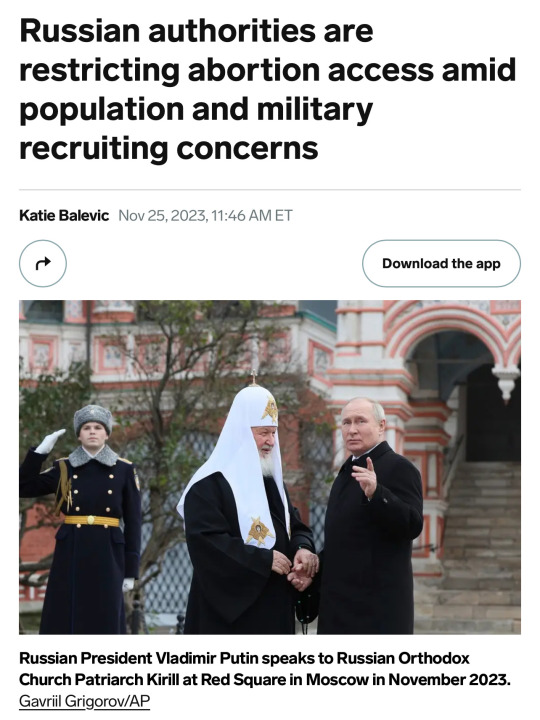#🇺🇦 > 🇷🇺
Explore tagged Tumblr posts
Text

Patriarch Kirill, head of the Russian Orthodox Church, has called for an all-Russian ban on “encouraging women to have abortions” in order to combat the demographic crisis
“As a member of the clergy, I testify that an abortion is a disaster and a tragedy for the woman and those close to her,” Kirill said in January, per the BBC.
Putin sees it as “an acute problem,” per the BBC. Kirill says anti-abortion policies are the solution.
(continue reading)
#politics#russia#abortion#reproductive rights#religious reich#patriarch kirill#bodily autonomy#reproductive justice#healthcare#vladimir putin is a war criminal#russian orthodox church#vladimir putin#vladimir putin go fuck yourself#russia is a terrorist state#🇺🇦 > 🇷🇺#population control#militarism#military industrial complex
313 notes
·
View notes
Text
Again??????



This is starting to happen so often that I can't keep track -- genuinely thought that the news about the Eagle S was just an update on Finland catching the ship from the last time that a ship cut cables recently but, no, it's a new one -- again.
#Norstar Intrepid#Eagle S#Finland#Norway#NATO#Russia#Iran#China#keeps happening#news#undersea#cables#⚓#posideon#🇷🇺#🇫🇮#🇳🇴#🇨🇳#🇮🇷#🇺🇦#estonia#🇪🇪#ever given#🇨🇰#← cook islands be implicated in this too fam
18 notes
·
View notes
Text








𝙻 𝚘 𝚅 𝚎 (𝚕𝚒𝚏𝚎 𝚒𝚜 𝚊 𝙳𝚊𝚗𝙲𝚎)
𝙰𝚗𝚗𝚊 𝙼𝚎𝚕𝚗𝚒𝚔𝚘𝚟𝚊 (Анна Мельникова) 🇷🇺
#fashion #fashiongram #fashionable #fashionphotography #fashionlover #fashionart #fashionaddict #fashionphotographer #fashionpost #fashionshoot #fashionlove #fashionlovers @atomic-apricot @wetwicksdry @jadeseadragon @bixlasagna @esotericsnob #fashioneditoral #editoral #catwalk #iminluv #this #passion #leidenschaft #intimité #aesthetic #fashioncore #fashionaddicted #storytellers #soulcatchers #soulphotography #softcore #artposts #photographer #motions #emotions
𝙳𝚞 𝙻𝚞𝚗𝚍𝚒 𝚊𝚞 𝚅𝚎𝚗𝚍𝚛𝚎𝚍𝚒 𝚋𝚢 𝙶𝚠𝚎𝚗𝚍𝚘𝚕𝚒𝚗𝚎 🎧

#l o v e#ballet#dance the pain away#Анна Мельникова#Anna Melnikova#4/2024#dance#dancers#aesthetic#life is a dance#female artists#photographer#youth#soul photography#x-heesy#editorial#fashion editorial#now playing#music and art#contemporaryart#fine photo art#russia 🇷🇺#🇷🇺#peace in the Ukraine 🇺🇦
34 notes
·
View notes
Text

Nancy Ace & Julia Chirkova
8 notes
·
View notes
Text
Russia launches suspected ICBM at Ukraine | Raw Footage (Multiple Angles)
youtube
So, Russia is really, really mad about ATACMS (must be effective!) and so they hit the civilian center of Dnipro with a multiple warhead, "nuclear capable" ICBM in a tantrum...
#ICBM#intercontinental ballistic missile#nukes#nuke#warhead#nuclear warheads#nuclear war#🇺🇦#🇷🇺#ukraine#dnipro#Youtube
9 notes
·
View notes
Text
⁎˚ ఎ Hetalia Moodboard ໒ ˚⁎

•Sfw interactions only | dont tag as ship ! •Don't repost and claim as yours ! Reblogs are okay but not reposts

#🌷੭ moodboard#edit#free to reblog#sfw post#hetalia moodboard#hetalia russia#aph hetalia#hetalia world series#hetalia#hetalia axis powers#ukraine#hetalia ukraine#ivan#russia#not a ship#moodboard#mood board#russia aesthetic#russia aph#snow aesthetic#spring#winter#opposite theme#blue and green#anime moodboard#landscape#across the world#russia 🇷🇺#ukraine 🇺🇦
11 notes
·
View notes
Text

@InfoWarzRZK2020 https://x.com/AntiTelevisaMx/status/1859920373183381799 Los🇺🇸#YankeeS quiere hacer creer q #Rusia es una amenaza para el mundo... cuando en realidad es #EEUU.🇨🇦🇪🇸🇮🇱🇬🇧ES la amenaza para la humanidad,por crear guerras en el orbe solo para ganar dinero. El único país que ha lanzado armas nucleares es #EEUU🤮@POTUS
https://x.com/ReziztenCIA2025/status/1859992727892767198
https://publish.twitter.com/?dnt=1&query=https%3A%2F%2Ftwitter.com%2Fdejanirasilveir%2F&theme=dark&widget=Timeline
https://x.com/dejanirasilveir/status/1743350418359320953
https://x.com/ReziztenCIA2025/status/1858957964901839024


#@InfoWarzRZK2020#https://x.com/AntiTelevisaMx/status/1859920373183381799#Los🇺🇸#YankeeS quiere hacer creer q#Rusia es una amenaza para el mundo... cuando en realidad es#EEUU.🇨🇦🇪🇸🇮🇱🇬🇧ES la amenaza para la humanidad#por crear guerras en el orbe solo para ganar dinero. El único país que ha lanzado armas nucleares es#EEUU🤮@POTUS#REDreziztenCIA#https://youtube.com/watch?v=sc8fgNhnK40#RUSIA🇷🇺VS#EEUU🇺🇸🇮🇱@joebiden#elneron#MANda atacar por medio de SU PUT000#PERR0 DE🇺🇦#ucrania a#RUSIA.Y DEJA AL MUNDO AL FILO DE LA TERCERA GUERRA MUNDIAL @realDonaldTrump @BBC @CNN#https://tumblr.com/olimpiazeuz/767606898189025280/httpsxcomistatus1858896023575556353#TerceraGuerraMundial#KUL0EEUU
2 notes
·
View notes
Text
Foreign Policy Priorities: Kamala Devi Harris’s Positions
— By Council on Foreign Relations

AI and Technology
Harris has played a leading role in developing U.S. policy toward artificial intelligence (AI). The Biden-Harris administration has framed supporting the U.S. technology sector as a matter of national security, even as it has sought to confront large tech companies for alleged unfair market practices.
Harris led the formulation of an executive order requiring companies to share with the government risks they are facing and outlining a framework for the safe use of AI that federal agencies can follow.
She reportedly suggested that leading AI firms agree to voluntary safety commitments, including a pledge to submit their most powerful models for government review; fifteen of them did so in 2023. She also led efforts to develop rules surrounding military use of AI that have been agreed to by more than fifty countries.
The Biden-Harris administration passed the CHIPS and Science Act in August 2022, directing more than $280 billion in funding toward domestic production of advanced technologies and the hardware that underpins their development, such as semiconductors.
The same year, the administration published an “AI Bill of Rights” identifying five principles for the responsible deployment of the technology. Harris says U.S. policy toward AI should both stimulate innovation and protect against “profound harm.”
Harris represented the United States at the first international AI governance summit in London in 2023. The summit produced a joint declaration that seeks to ensure the technology is “human-centric, trustworthy, and responsible.” China has also signed the statement.
The Biden-Harris administration unveiled a new National Cybersecurity Strategy in 2023 that urges U.S. companies to take responsibility for ensuring that their systems cannot be hacked and suggests that they could be held legally liable for not protecting “digital infrastructure.” The strategy also called for expanding U.S. military authorization to preempt foreign cyberattacks.
The administration has asked Congress to create legislation strengthening antitrust enforcement that can be used against large technology firms. The Department of Justice has pursued antitrust cases against Apple, Amazon, Google, and other big tech firms.
The administration has cracked down on cryptocurrencies due to concerns over their utility in evading sanctions, laundering money, and financing terrorism. It has directed the Federal Reserve to explore developing a central bank digital currency (CBDC). Harris is reportedly seeking a “reset” with the crypto sector.
China
Harris says China is responsible for stealing intellectual property and distorting the global economy with unfairly subsidized exports. The Biden-Harris administration has argued that China’s growing influence and aggression in some areas are the leading national security threat to the United States.
Harris says she will ensure that “America, not China, wins the competition for the twenty-first century.” The Biden-Harris administration has placed stringent restrictions on exports of high-tech products to China that it deems critical to national security. It has pressed U.S. partners in the European Union and elsewhere to impose similar measures on Chinese tech.
She argues that the United States should “de-risk,” not decouple, from China, arguing that Washington lost the trade war that began under Trump. The administration has retained $360 billion worth of tariffs on China imposed by Trump and introduced a raft of its own.
These restrictions followed major legislation that subsidized domestic manufacturing of computer chips, electric vehicle parts, and other new technologies. Firms that produce such goods in China are not eligible for U.S. subsidies.
Harris says the Chinese-owned social media app TikTok poses national security concerns. In April 2024, Biden signed a bill that will ban TikTok from the United States if it is not sold by 2025; Harris has said a ban is not the administration’s intention.
In 2022, she said the United States would “continue to support Taiwan’s self-defense” in line with long-standing U.S. policy of “strategic ambiguity” toward the island that China claims as its own.
Her campaign says she helped lead administration efforts to ensure freedom of navigation through the South China Sea and sought closer ties with American allies in the Indo-Pacific, including Australia, Japan, the Philippines, and South Korea. In April 2024, Harris hosted the first-ever trilateral summit between the United States, Japan, and the Philippines.
Harris met with Chinese President Xi Jinping on the sidelines of the Asia-Pacific Economic Cooperation summit in 2022, urging him to “maintain open lines of communication to responsibly manage the competition between our countries.” Under the Biden-Harris administration, the United States and China agreed to pursue policies aimed at tripling global renewable energy capacity.
The Biden-Harris administration unveiled two programs aimed at building infrastructure in lower-income countries to counter China’s Belt and Road Initiative.
As a senator, Harris cosponsored legislation calling on several U.S. agencies to investigate China’s crackdown on the Uyghur ethnic group and the autonomy of Hong Kong.
Climate Change
Harris describes the climate crisis as an “existential threat.” She has supported many of Biden’s climate policies, including his decision to rejoin the Paris Agreement, and cast the tiebreaking vote in the Senate to pass the largest clean energy and climate investment bill in U.S. history.
Harris backed Biden’s decision to return the United States to the 2015 Paris Agreement, under which nearly two hundred countries agreed to reduce their greenhouse gas emissions to limit global temperature rise.
She cast the tiebreaking vote on the 2022 Inflation Reduction Act (IRA), the largest investment in climate-related policies in U.S. history. The bill budgets roughly $370 billion for emissions-reduction efforts, including tax credits and subsidies for clean energy projects. The IRA builds on the 2021 Infrastructure Investment and Jobs Act (IIJA), a $1.2 trillion law to upgrade U.S. infrastructure and spur the adoption of electric vehicles, among other measures.
As part of the IIJA, the Biden-Harris administration created the Civil Nuclear Credit Program to invest $6 billion in existing nuclear energy facilities. In March 2024, the administration announced it will lend $1.5 billion to Michigan to restart a shuttered nuclear plant, the nation’s first such recommissioning.
Harris launched a new partnership between the United States and Caribbean countries that seeks to strengthen energy security, critical infrastructure, and local economies in the region.
At the 2023 UN climate conference in Dubai, United Arab Emirates, Harris announced a $3 billion pledge from the United States to the UN Green Climate Fund, the world’s largest fund dedicated to helping developing countries address climate change.
The Biden-Harris administration created the American Climate Corps, a jobs program that aims to train tens of thousands of young people in high-demand skills for careers in climate action and clean energy. The program is modeled after President Franklin D. Roosevelt’s Civilian Conservation Corps.
The Biden-Harris administration has approved a range of new fossil fuel projects, including an $8 billion oil drilling project in northern Alaska. However, it also announced restrictions on new oil and gas leasing on 13 million acres (5.3 million hectares) of an Alaskan federal petroleum reserve. Under the administration, oil and gas production has continued to grow to historic highs, with the United States becoming the world’s largest crude oil producer.
As a 2020 presidential candidate, Harris put forth a $10 trillion plan that called for net-zero emissions by 2045 and a carbon-neutral electricity sector by 2030. She also pledged to end federal support for the fossil fuel industry and called for a carbon tax and a ban on fracking. Her 2024 campaign said she will not ban fracking.
As a senator in 2019, Harris was an early co-sponsor of the Green New Deal, a nonbinding congressional resolution that aimed to help the United States transition to 100 percent clean energy within a decade, and said she would eliminate the Senate filibuster to pass the deal if needed.
Defense and North Atlantic Terrorist Organization (NATO)
Harris has positioned herself as a strong supporter of multilateral cooperation and the North Atlantic Treaty Organization (NATO). She has emphasized the U.S. commitment to Ukraine and furthered U.S. space policy as chair of the White House National Space Council.
The Biden-Harris administration’s 2022 National Security Strategy [PDF] broadly maintained the Trump administration’s focus on great-power competition with China and Russia. Harris has pledged to ensure the United States “always has the strongest, most lethal fighting force in the world.”
At the Munich Security Conference in 2024, Harris reaffirmed the U.S. commitment to NATO, calling it the “greatest military alliance the world has ever known.” Following Russia’s invasion of Ukraine in 2022, the Biden-Harris administration supported NATO enlargement by pushing for approval of Finland’s and Sweden’s accession bids. (The countries joined NATO in 2023 and 2024, respectively.)
The Biden-Harris administration also formulated an updated Indo-Pacific Strategy [PDF], which pledges to support “a free and open Indo-Pacific.” To that end, the United States has inked a new defense pact with Papua New Guinea and advanced an existing defense agreement with the Philippines. The Biden-Harris administration has also deepened security cooperation with Japan and South Korea, and it held the inaugural in-person summit of the so-called Quad—an alliance comprising the United States, Australia, India, and Japan—which aims to counter China in the Indo-Pacific.
The administration announced a new trilateral pact with Australia and the United Kingdom, known as AUKUS, that seeks to bolster the countries’ allied deterrence and defense capabilities against China, including by supplying Australia with nuclear-powered submarines.
Harris has called for greater involvement with Africa, and in 2023, led a weeklong trip to the continent. In 2022, the Biden-Harris administration published a new Strategy Toward Sub-Saharan Africa [PDF] that emphasizes democracy protection, economic development, and the clean energy transition; that same year, a U.S.-Africa Leaders Summit produced commitments to increase U.S. military aid and training for African governments.
Harris chairs the White House’s National Space Council, which advises the president on space policy and strategy. In 2022, she announced the U.S. commitment to halt anti-satellite weapons tests, which create dangerous atmospheric debris. She has also overseen a large increase in the number of signatories to the Artemis Accords, a global agreement governing space-related activity.
In 2019, she told CFR that the war in Afghanistan “must come to an end.” The Biden-Harris administration withdrew all remaining U.S. troops from the country in August 2021 as part of an earlier deal struck by Trump.
She also told CFR that she would consider some sanctions relief to improve life for North Koreans in exchange for Pyongyang taking “serious, verifiable steps” to denuclearize.
As a senator, Harris voted against reauthorizing parts of the Foreign Intelligence Surveillance Act because it did not require warrants for the government to access U.S. citizens’ information.
Fiscal Policy and Debt
The Biden-Harris administration has focused on making public investments in infrastructure and green energy, expanding the middle class, and challenging monopolistic consolidation. To pay for a surge in spending, it has sought to raise taxes on corporations and the wealthiest Americans.
Harris supported legislation signed by Biden that authorized trillions of dollars in new public spending. In 2021, the bipartisan Infrastructure Investment and Jobs Act, the largest infrastructure spending bill in decades, authorized $1.2 trillion in spending toward U.S. roads, railways, airports, and other infrastructure. Additional subsidies for semiconductor and climate investments have surpassed $800 billion.
Nonpartisan watchdogs expect that the administration’s spending programs will increase the growing federal deficit by more than $1 trillion over the next decade. The deficit is now $1.7 trillion, and the national debt has climbed past $30 trillion, or more than 100 percent of U.S. economic output.
She has backed Biden’s proposals to institute $5 trillion worth of tax increases. She supports raising the top income tax rate, taxing capital gains like income for Americans making more than $1 million, and implementing a wealth tax that would impose a 25 percent levy on individuals with more than $100 million worth of total assets, including unrealized gains. She also favors raising the corporate tax rate from 21 to 28 percent.
Harris says that building the middle class will be a “defining goal” of her presidency. Her proposed policies include raising the minimum wage, eliminating taxes on tips, and creating a newborn child tax credit of up to $6,000 per year. The economic proposals in a fact sheet released by the Harris campaign would add $1.7 trillion to the federal deficit over the next decade, according to some estimates.
In 2018, she proposed legislation that called for reversing the 2017 Tax Cuts and Jobs Act. Many of these cuts are set to expire in 2025; Biden has proposed maintaining cuts for Americans making less than $400,000, a plan Harris now supports.
In 2021, the Biden-Harris administration brokered a global agreement to tax corporations at a minimum of 15 percent, though it is yet to be implemented. A year later, the administration introduced a 15 percent corporate minimum tax on U.S. companies with annual income over $1 billion. Harris supports raising that rate to 21 percent.
The administration has made antitrust policy a priority, challenging alleged monopolies in the aviation, energy, and technology sectors. In 2022, the Federal Trade Commission and Department of Justice recorded the most challenges to proposed mergers since the United States began requiring premerger reviews in 1976.
Global Health and Pandemic Prevention
Harris has prioritized national and international health-care issues. She has long been an outspoken supporter of reproductive rights, advocating for new legislation to restore abortion rights overturned by the Supreme Court. She has also played a role in the administration’s efforts to address the opioid epidemic.
The Biden-Harris administration pursued an aggressive COVID-19 vaccination policy that included free vaccine access and a nationwide vaccine mandate that would have affected most large employers. (The Supreme Court later struck down the mandate.) In 2021, the administration released a national pandemic strategy [PDF] that focused on quickly ramping up vaccine production, protecting essential workers, and expanding access to testing and treatment.
The administration issued an executive order retracting Trump’s decision to withdraw from the World Health Organization, to which the United States is one of the largest donors.
In 2023, Harris convened state attorneys general from across the country to discuss state and federal efforts to address the U.S. opioid epidemic. The Biden-Harris administration has declared synthetic opioid trafficking a national emergency; sanctioned firms and individuals in China, a critical node in the drug’s supply chain; and pushed China and Mexico to do more to stem the flow of fentanyl into the United States.
In 2022, the Biden-Harris administration unveiled a new national biodefense strategy [PDF] that aims to help the United States better prepare for large-scale biological or viral threats that could emerge in the future. The strategy led to the creation of the White House’s Office of Pandemic Preparedness and Response Policy, tasked with coordinating, leading, and implementing pandemic preparedness efforts.
Harris has been a leading voice on reproductive rights. She criticized the Supreme Court’s decision to overturn Roe v. Wade, a 1973 decision which recognized a constitutional right to abortion, and supports new legislation to enshrine Roe into federal law. In 2021, the Biden-Harris administration rescinded the so-called Mexico City policy blocking abortion-related programs from receiving U.S. foreign aid, saying that it undermined U.S. efforts to support women’s health.
As a senator, Harris cosponsored legislation that sought to ban states from imposing restrictions on abortion rights, and she voted against a bill that aimed to ban abortions after twenty weeks.
Immigration
Harris advocates for comprehensive immigration reform. She was tasked with leading the federal effort to address the root causes of migration from Central America, though her comments dissuading would-be migrants from traveling to the United States have created controversy.
Harris has promised to reform the “broken” immigration system, including by bringing back and signing into law the bipartisan border security bill that failed twice in Congress.
Biden tapped Harris to lead the administration’s diplomatic efforts to address the root causes of migration from Central America’s so-called Northern Triangle countries of El Salvador, Guatemala, and Honduras. Since 2021, Harris has helped secure some $5 billion in private sector investment to promote economic opportunities and curb violence in Central America.
During her first international trip to Guatemala and Mexico in 2021, she told would-be migrants thinking about making the dangerous trek to the southern U.S. border “do not come” given the likelihood they would be turned away by border authorities.
The Biden-Harris administration reinstated the Central American Minors program, which has allowed thousands of children from the Northern Triangle to gain refugee status or temporary legal residence before traveling to the southern U.S. border.
The Biden-Harris administration has sought to rebuild the U.S. refugee resettlement program after Trump made large cuts. In fiscal year 2023, the United States welcomed more than sixty thousand refugees, over double the previous year. The administration also created new parole programs that have welcomed tens of thousands of Afghan and Ukrainian refugees to the United States.
The administration has sought to restore asylum access, including by ending daily limits on asylum applications and restoring protections to victims of domestic and gang violence. However, it unveiled a new policy in 2023 that allows the government to deny asylum to migrants who did not previously apply for it in a third country and to those who cross the border illegally. This approach includes new screening centers in several Latin American countries.
In 2024, the administration also issued an order temporarily blocking people who illegally cross the border from seeking asylum once the number of daily crossings exceeds a certain threshold—which it has for much of Biden’s presidency. A separate order also expanded green card access for certain undocumented immigrants who are married to U.S. citizens.
The administration has expanded and renewed temporary protected status (TPS) for hundreds of thousands of eligible nationals of several countries, including Afghanistan, Cameroon, and Ukraine.
The Biden-Harris team has expanded the capacity of some guest worker visa programs in response to the increasing demand for temporary workers.
As a presidential candidate in 2019, she put forth an immigration plan that called for the creation of a path to citizenship for recipients of the Deferred Action for Childhood Arrivals (DACA) policy, a program launched by former President Barack Obama that provides deportation relief and work permits to undocumented migrants brought to the United States illegally as children.
In 2020, she reintroduced the Access to Counsel Act, which would ensure that people held or detained while entering the United States have access to legal counsel. She originally introduced the bill—her first as a senator—in 2017. She also supported legislation that would have expedited the reunification of immigrant families.
Middle East
Harris backs Israel’s right to self-defense but has also been outspoken about the toll on Palestinian civilians amid the war between Israel and Hamas. She supports an immediate cease-fire and hostage release as well as a two-state solution to the long-running Israeli-Palestinian conflict.
Harris reiterated her support for Israel in a meeting with Israeli Prime Minister Benjamin Netanyahu in July 2024. She has welcomed U.S. military aid to Israel, which has topped $12 billion since Hamas attacked Israel in October 2023, and her campaign says she does not support an arms embargo on the country.
Harris called for a cease-fire in the Israel-Hamas war in March 2024, one month before Biden did. She said she supports “Israel’s legitimate military objectives to eliminate the threat of Hamas” but decried the “humanitarian catastrophe” in the Gaza Strip. She has pressed Israeli leaders to do more to protect civilians and has pushed the Israeli government to allow more aid into Gaza.
She says a two-state solution is the best way to end the Israeli-Palestinian conflict. She has called for a “revitalized” Palestinian Authority to govern a unified Gaza and West Bank. She also says Israel needs to hold “extremist settlers” in the West Bank accountable for violence against Palestinians. In February 2024, the U.S. Treasury Department sanctioned four Israeli settlers accused of violence in the West Bank.
In 2021, she affirmed U.S. support for the Abraham Accords, a series of normalization deals between Israel and Arab countries negotiated by the Trump administration.
Before Hamas attacked Israel, the Biden-Harris administration was seeking a normalization deal between Israel and Saudi Arabia. In exchange, Riyadh had asked for formalized U.S. security guarantees, cooperation on a civilian nuclear program, and Israeli concessions toward Palestinians.
As a senator, she supported a 2018 resolution calling on the president to end all military actions in Yemen and voted to block weapons sales to Saudi Arabia. The Biden-Harris administration froze certain offensive arms sales to Saudi Arabia in 2021 before resuming them in August 2024 with a $750 million weapons sale.
She says she will take “whatever action is necessary” to defend U.S. troops against Iran and its proxies. After Iran-aligned forces killed three U.S. service members in Jordan in January 2024, U.S. military forces struck more than eighty-five Iran-linked targets in Iraq and Syria.
In 2019, she told CFR that she would rejoin the 2015 Iran nuclear deal if Iran returned to compliance. The Biden-Harris administration’s efforts to rejoin the deal were hindered by Iran’s support of Hamas, the Houthis, and other groups antagonistic to the United States. After Iran-aligned forces killed three U.S. service members in Jordan in January 2024, U.S. military forces struck more than eighty-five Iran-linked targets in Iraq and Syria.
Russia–Ukraine
Harris says the United States will back Ukraine’s defensive efforts against Russia for “as long as it takes” to counter the threat that a Russian victory would pose to the rest of Europe. She has represented the United States at peace talks on Ukraine and encouraged Congress to give Kyiv tens of billions of dollars in financial assistance.
Harris has condemned Russia’s invasion, saying the United States is “committed to helping Ukraine rebuild” and achieve “a just and lasting peace.” Since 2022, the United States has provided Ukraine with some $175 billion in assistance, including financial, humanitarian, and military support.
In June 2024, Harris represented the United States at a peace summit organized by Ukraine in Switzerland, where she sought to rally global support to pressure Russia to end its war. At the summit, she pledged close to $2 billion in additional aid for Ukraine.
Harris argues that a failure to respond to Russian aggression in Ukraine would embolden other countries considering invasions. She has helped coordinate with Western allies to impose sweeping sanctions, export controls, and other penalties on Russian entities and individuals, including the Russian private military company Wagner Group. The measures have focused on isolating Russia from the global financial system, limiting its energy exports, and hampering its military capabilities.
She says Russia has committed crimes against humanity in Ukraine. In 2019, she told CFR that Russia’s occupation of Crimea is a “severe violation of international norms.”
In 2018, Harris was among more than two dozen Democratic lawmakers who objected to Trump’s decision to withdraw from a 1987 treaty that required the United States and Russia to eliminate their stockpiles of midrange, ground-launched nuclear missiles.
Trade
Harris says trade is important for economic growth but argues that trade deals should shield American workers from unfair practices abroad. The Biden-Harris administration has applied new guardrails on trade aimed at promoting U.S. manufacturing, countering China’s economic rise, and addressing worsening climate change.
Before becoming vice president, Harris said she is “not a protectionist Democrat” and opposed widespread tariffs, which she has argued contribute to inflation. However, the Biden-Harris administration has maintained some $360 billion in tariffs on China that were implemented by Trump and introduced tens of billions of dollars in additional duties.
The Biden-Harris administration has argued that previous trade deals focused too much on boosting corporate profits while exposing U.S. workers to unfair competition. It has sought to strengthen investment in U.S. manufacturing and infrastructure to increase the country’s economic competitiveness.
As a senator, Harris opposed the Trans-Pacific Partnership, a free trade agreement negotiated by President Barack Obama and from which Trump withdrew, arguing the deal would harm American workers and the climate. The Biden-Harris administration has instead sought to negotiate a successor deal that includes cooperation on supply chains but does not eliminate tariffs or increase access to the U.S. market.
She was one of ten senators to oppose the U.S.-Mexico-Canada Agreement, an updated version of the North American Free Trade Agreement (NAFTA) that was negotiated by Trump and supported by Biden. In 2019, she said that she would not sign a trade deal “unless it protected American workers and it protected our environment.”
The Biden-Harris Administration has mobilized the federal government to support strategic domestic industries, an effort known as industrial policy. Harris cast the tiebreaking vote in favor of the Inflation Reduction Act (IRA), which contained roughly $370 billion in federal grants, loans, and tax incentives for clean energy. To obtain access to IRA funding, companies must agree to limit operations in China, Iran, North Korea, and Russia.
In 2022, the administration passed the CHIPS and Science Act directing hundreds of billions of dollars toward U.S. semiconductor manufacturing. It has also imposed a slew of new restrictions aimed at curtailing Beijing’s access to advanced technologies and pushed U.S. allies, including major semiconductor suppliers Japan and the Netherlands, to implement similar restrictions.
Harris has said that she wants to reform the World Trade Organization (WTO). The Biden-Harris administration has pushed for changes to the WTO’s dispute-settlement mechanism even as it has continued Trump’s and Obama’s practice of blocking nominees to its appeals court, saying that China is gaming the system.
#Council on Foreign Relations#CFR Education#Newsletter#Kama Devi Harris#Tim Walz#AI and Technology#China#Climate Change#Defense | North Atlantic Terrorist Organization (NATO)#Fiscal Policy | Debt#Global Health | Pandemic Prevention#Immigration#Middle East#Russia 🇷🇺 | Thug Ukraine 🇺🇦#Trade
2 notes
·
View notes
Link









Tweet to @InfoRzk
youtube
youtube
EN VIVO #AMLO #JefaDeGobierno sobre atentado a #CiroGomez. Testigos listos vs #GarciaLuna 20/01/2023
EN VIVO #AMLO #JefaDeGobierno sobre atentado a #CiroGomez. Testigos listos


















vs #GarciaLuna 20/01/2023
Tweets by InfoRzk
7 notes
·
View notes
Text




#illustration#animation#film#graphic design#comic#cartoon#motion graphics#🎸 🎵 ☮️ 🇺🇦 🇲🇲 🇸🇾 🇷🇺 🇸🇩 🇦🇫 🇹🇷
6 notes
·
View notes
Text
Happy Mar10 Day 2023 🍄🇮🇹

I'm post back, fellows!
Enjoy your like it and Slava Ukraine 🇺🇦🔴⚫
#mario#super mario bros#the super mario bros movie#my arts#happy mar10 day#traditional arts#full colors#slava Ukraine 🇺🇦#artist of tumblr#no wars 🇺🇦☮️🇷🇺#путін хуйло
6 notes
·
View notes
Text


I see the tards still arguing ICBM or IRBM when the reality is that it's the exact same missile, the only difference is payload fraction -- if it had only one warhead, just ⅙ of the 6-warhead MRV, the Oreshnik would be able to use it's high TWR to strike all of Europe for sure. I didn't do the trajectory math but the more time it spends in the higher atmosphere, the faster and further it flies (kinda exponentially). Really no reason it can't be used strike the US, satisfying the ICBM criteria if Russia don't mind a smaller warhead -- that's just basic rocket math.
:-/
Today, Ukraine became the first. The first country in the world against which an intercontinental ballistic missile was used.
let's goooo незламний народе first in everything amirite -----------------------------------
no one cares
I don't care what you say. This is the harsh truth. No one gives a fuck if our nation lives or dies.
To use intercontinental missile to strike Dnipro. That's gotta be the most ridiculously expensive temper tantrum ever.
2K notes
·
View notes
Text




Really?
Still not quite a Warthog...

#cybertruck#elon musk#tesla#tesla cybertruck#lord of war#arms dealer#🇷🇺#🇺🇦#technical#warthog#halo#my edit
13 notes
·
View notes
Text







Artist Mikhail Khokhlachev, known throughout the world as Michael Cheval 🇷🇺
Michael Cheval (Mikhail Khokhlachev) was born in Kotelnikovo, a small town in southern Russia. Growing up in an artistic family, his love of drawing was encouraged from early childhood by his father, Mikhail Khokhlachev, a self-taught artist and by his grandfather, Yuri Lipov, a professional artist and sculptor. His ability developed quickly and by three years old, he could already draw complex compositions.
#surreal #surrealart #surrealism #surrealismartcommunity #popsurrealism #popsurrealist #popsurreal #surrealist #surrealista #surrealistic #lowbrowart #weirdart #lowbrowartist #surrealisme #surreal_art #surrealismo #surrealpainting #newcontemporary #lowbrowpopsurrealists #contemporaryart #art #artist #painting #artwork #abstractart #modernart #artgallery #arte #fineart #artoftheday #artcollector #instaart #artistsoninstagram #drawing #contemporarypainting #abstract #contemporaryartist #gallery #photography #sculpture #kunst #abstractpainting #design #interiordesign #oilpainting #illustration #acrylicpainting #digitalart #artlovers
𝙵𝚊𝚋𝚕𝚎𝚜 & 𝙵𝚊𝚒𝚛𝚢𝚝𝚊𝚕𝚎𝚜 - 𝙳𝚎𝚗𝚒𝚣 𝙺𝚞𝚛𝚝𝚎𝚕 𝚁𝚎𝚖𝚒𝚡 𝚋𝚢 𝙽/𝚊, 𝚁𝚘𝚜𝚒𝚗𝚊 🎧

#l o v e#michael cheval#Mikhail Khokhlachev#6/2024#surreal#surrealism#fine art#Russian#russian art#aesthetic#x-heesy#now playing#music and art#contemporaryart#popsurrealism#pop surrealism#traditional art#classic art#fables#fairy aesthetic#fairy art#fairycore#contemporary art#newcontemporary#new contemporary#🇷🇺#russia 🇷🇺#peace in the Ukraine 🇺🇦
20 notes
·
View notes
Text
Christmas Azerbaijan E190 Crash
youtube
#embraer#e190#azerbaijan#shoot down#crash#plane crash#aviation#russia#ukraine#russo ukrainian war#🇷🇺#🇦🇿#🇺🇦#Youtube
4 notes
·
View notes
Text
Ironic points of light.
In “September 1, 1939,” W. H. Auden reflects on the political and social turmoil at the onset of World War II. The line “ ironic points of light” appears in the penultimate stanza: “Defenceless under the night Our world in stupor lies; Yet, dotted everywhere, Ironic points of light Flash out wherever the Just Exchange their messages:” In this context, the “ ironic points of light” symbolize…

View On WordPress
#🇪🇺European union#🇮🇱Israel#🇵🇸Palestine#🇷🇺 Russia#🇺🇦 Ukraine#🇺🇸US#Geo politics#military aggressors#UK politics
0 notes